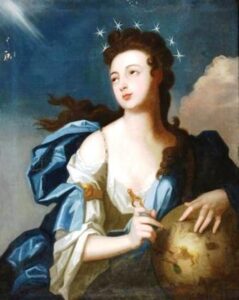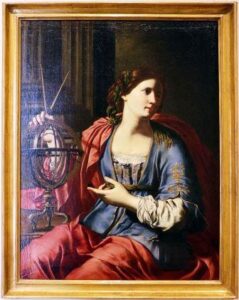Learn about the representations and attributes of Urania – the Muse of Astronomy and Astrology.
This article contains a video explaining the 9 muses.
She was also considered the Muse of Mathematics and of all the exact sciences.
 Allegorical Portrait of Urania, Muse of Astronomy by Louis Tocqué.
Allegorical Portrait of Urania, Muse of Astronomy by Louis Tocqué.
Urania | Astronomy and Astrology
She was also considered the Muse of Mathematics and of all the exact sciences.
The classical representation is dressed in blue, with a globe and a compass in hands.
She has a star diadem or stars on her dress.
 Giacinto Gemignani, L’astonomia, 1652 ca
Giacinto Gemignani, L’astonomia, 1652 ca
The Muses
The ancient Greeks believed that their work was inspired and helped directly by the Muse of the art in which they fit.
For this reason, all epic poems, for example, typically begin with a request from the author to the muse Calliope, so that she inspires him.
From the from the relationship of Mnemósine with Zeus the Muses were born: Calliope, Clio, Erato, Euterpe, Melpomene, Polymnia, Terpsichore, Talia and Urania.
Initially, the muses were created to celebrate the victory of the gods over the Titans, in the so-called Titanomachy.
Considered deities of spring, over time their importance increased until they became goddesses – and responsible for human inspiration.
Museum
Museum, from the Greek Moiseum, means Temple of the Muses, and in Alexandria, already in antiquity, this designation was used for places that served to the study of the art and the sciences, fields connected to these mythological beings.
The Muses inspired the names of the museums, but do you know who these creatures were?
They are nine muses and each one is linked to some scientific or artistic component.
They are: Calliope, muse of eloquence and heroic poetry; Clio, muse of history; Erato, muse of lyric and erotic poetry; Euterpe, muse of music; Melpomene, muse of tragedy; Polymnia, muse of sacred poetry; Terpsichore, muse of dance; Talia, muse of comedy and festivity and Urania, muse of astronomy.
